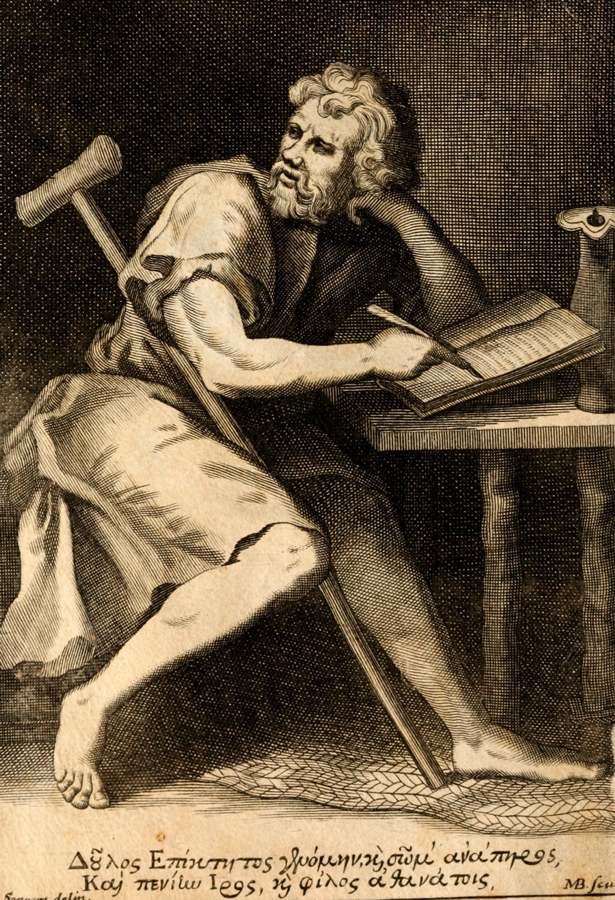|
Freedom from wanting things not in our control
 Epictetus (55-135 AD) was a Stoic philosopher. He was born a slave, but was educated by his rich masters. He was freed as a young man, and began teaching philosophy in Rome. When the emperor banished all philosophers from Rome, he went to Nicopolis, Greece, where he lived and taught until his death. Epictetus (55-135 AD) was a Stoic philosopher. He was born a slave, but was educated by his rich masters. He was freed as a young man, and began teaching philosophy in Rome. When the emperor banished all philosophers from Rome, he went to Nicopolis, Greece, where he lived and taught until his death.
Like other Stoics, Epictetus believed that many events in life are outside our control. We may plan as much as we want, and we may take as many precautions as we want, but our plans can always be disrupted by unforeseen events like sickness, accidents, chance, and other people’s actions. This means that in most areas of life we do not have full control, and therefore we are not free. There is only one place where we can be, according to Epictetus, fully free: In our inner world – in our decisions, our will, our intentions, our expectations. Nothing can stop me from making a certain decision, nothing can stop me from wanting something or not wanting it. I have complete control over my will and my thoughts.
Therefore, in order to be free, I must not depend on things outside my control, in other words on things outside me. I must not be attached to my house, to my reputation, my money, even my friends and family. I may try to do my family duties and social duties, but if misfortune strikes and my efforts fail, then I must accept this in peace and without complaint, without anger, without frustration. I accept the loss of my money, or of my house, or of my job, because I do not depend on them – I am free. I am not a slave to what I possess.
The following texts are adapted from two books, both of them compiled from Epictetus’ lectures by his student Arrian. Epictetus tells us here that freedom depends on our inner attitude, not on external conditions.
The Discourses
The man who is not under restraint is free, and for him things are exactly as he wishes them to be. But he who can be restrained or compelled or hindered, or thrown into any circumstances against his will, is a slave. But who is free from restraint? He who desires nothing that belongs to others. And what are the things which belong to others? The things which are not in our power to have or not to have, or to have of a certain kind, or in a certain manner. Therefore, the body belongs to another, the parts of the body belong to another, possession belongs to another… This road leads to freedom; that is the only way of escaping from slavery.
[...]
Diogenes was free. How was he free?
- Not because he was born of free parents, but because he was himself free, because he had cast off all the handles of slavery, and it was not possible for any man to lay hold of him or to enslave him. He had everything easily loosed, everything only hanging to him. If you laid hold of his property, he would rather let it go and let it be yours than follow you for it: if you laid hold of his leg, he would let go his leg; if of all his body, all his poor body; his intimates, friends, country, just the same… These were the things which permitted him to be free.
The Enchiridion
1. Some things are in our control and others not. Things in our control are opinion, pursuit, desire, aversion, or in short, whatever is our own action. Things not in our control are body, property, reputation, command, or in short, whatever is not our own action.
The things in our control are by nature free, unrestrained, unhindered; but those not in our control are weak, slavish, restrained, belonging to others.
10. If you see an attractive person, you will find that self-restraint is the ability you have against your desire. If you are in pain, you will find fortitude. If you hear unpleasant language, you will find patience. When you are accustomed to this, things will not hurry you away along with them.
 11. Never say about anything "I have lost it"; but "I have returned it." Is your child dead? It is returned. Is your wife dead? She is returned. Is your estate taken away? Well, isn’t it likewise returned? 11. Never say about anything "I have lost it"; but "I have returned it." Is your child dead? It is returned. Is your wife dead? She is returned. Is your estate taken away? Well, isn’t it likewise returned?
"But he who took it away is a bad man!"
What difference is it to you who the giver assigns to take it back? While he gives it to you to possess, take care of it; but don't view it as your own, just as travelers view a hotel.
14. If you want your children and wife and friends to live forever, you are stupid. Because you wish to be in control of things which you cannot control, you wish that things that belong to others would be your own... Whoever would be free, let him wish nothing, let him decline nothing which depends on others, or else he must necessarily be a slave.
15. Remember that you must behave in life like at a dinner party. Is anything brought around to you? Put out your hand and take your share with moderation. Does it pass by you? Don't stop it. Is it not yet come? Don't stretch your desire towards it, but wait till it reaches you. Do this with regard to children, to a wife, to public posts, to riches, and you will eventually be a worthy partner of the feasts of the gods.
17. Remember that you are an actor in a drama, of whatever kind the author wished to make it. If it is short, then short; if it is long, then long. If he wishes you to act the role of a poor man, or a cripple, or a governor, or a private person, make sure that you act it properly. Because this is your task, to act well the character that was assigned you. To choose your part is somebody else’s business..
19. … Don't wish to be a general, or a senator, or a consul, but to be free; and the only way to this is to have contempt for things that are not in our control.
|
REFLECTING ON EPICTETUS’ TEXT:
Epictetus tells us that in order to be free, you must not be attached to anything which is not fully in your control. If you depend on something that is not in your control, then you are a slave to external conditions. Freedom therefore means complete inner independence.
Epictetus knew that it is extremely difficult to achieve such independence. He therefore devised exercises to develop our ability to be emotionally unattached. It is a good idea to try some of his exercises, in order to understand his approach concretely, not just in theory.
One of his exercises involves the imagination: Sit quietly and close your eyes. Imagine that your favorite small object – your mug, or poster, or photo – is destroyed. Imagine your emotional reaction, and try imagining yourself responding with complete calmness and equanimity. Next, imagine that a more valuable object is destroyed – your computer, or your car. And again, imagine yourself responding calmly. Next, imagine a bigger disaster – a serious sickness for example, or your house burning down – and your calm response. And so on. Does this give you a sense of inner freedom?
Another exercise you could do is to observe yourself in everyday moments. Whenever you catch yourself responding with frustration or anger, note this fact, and also try to calm yourself down and feel peaceful and indifferent. Does this give you a sense of inner freedom?
After doing these exercises, you will be better ready to assess Epictetus' philosophy of freedom. Do you find his approach acceptable? Or, at least, do you accept certain aspects of his view? Would you modify his philosophy of freedom? Or reject it altogether? And if so, what exactly are your reasons?
|
|


 11. Never say about anything "I have lost it"; but "I have returned it." Is your child dead? It is returned. Is your wife dead? She is returned. Is your estate taken away? Well, isn’t it likewise returned?
11. Never say about anything "I have lost it"; but "I have returned it." Is your child dead? It is returned. Is your wife dead? She is returned. Is your estate taken away? Well, isn’t it likewise returned?